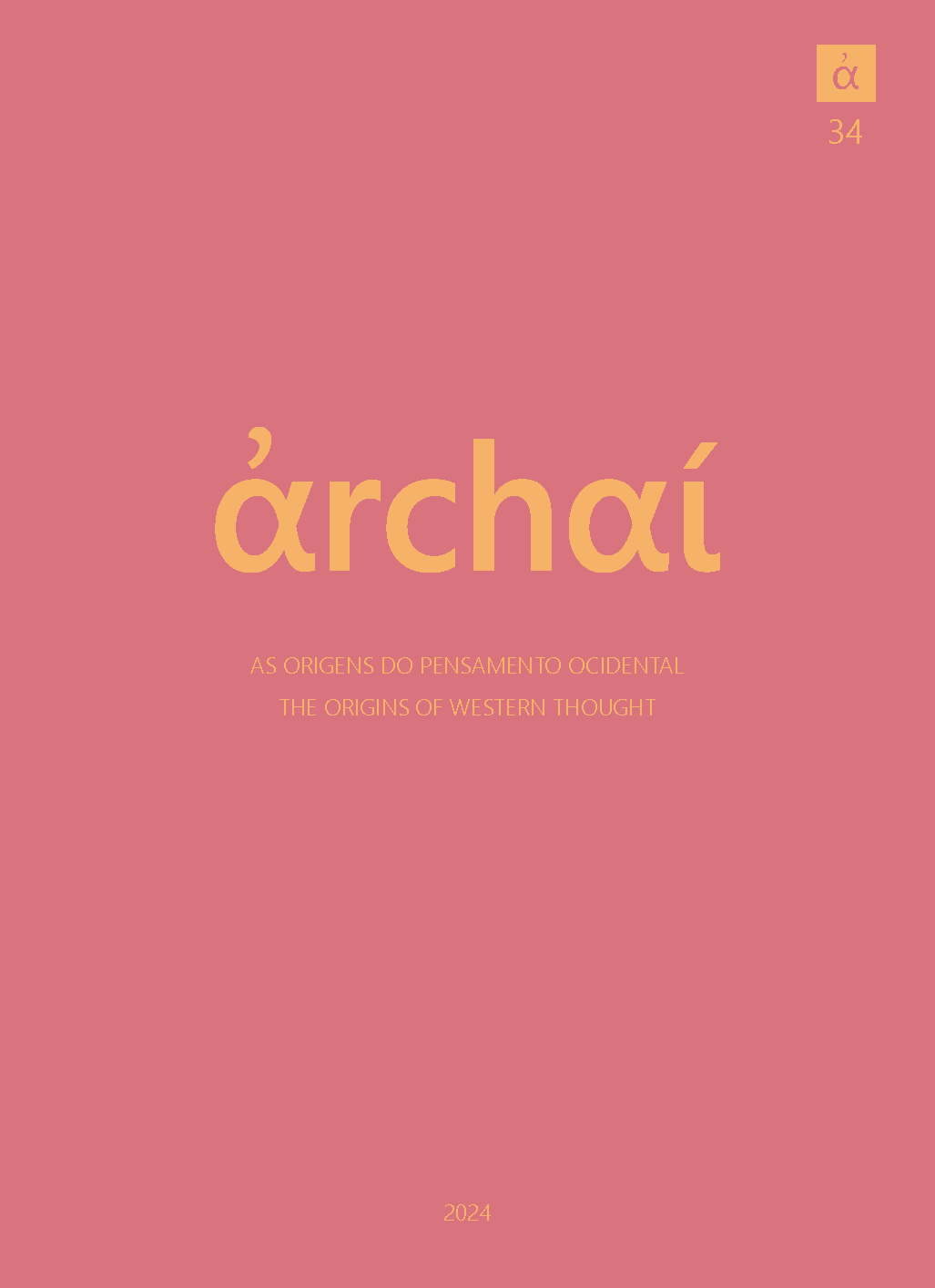Translation of Phaedrus' Speech in Plato's Symposium (Pl. Smp. 178a-180c)
DOI:
https://doi.org/10.14195/1984-249X_34_02Keywords:
Plato, Symposium, PhaedrusAbstract
In Plato's Symposium, Phaedrus is recognized as the "father of discourse" and occupies the first seat on the left. He introduces the theme of love, commencing his discourse with a series of references to tradition, including figures like Hesiod, Acusilaus, and Parmenides, to extol Eros. Phaedrus underscores the role of love in war, politics, and amorous relationships, emphasizing how love motivates humans to act exceptionally. His argument culminates in the notion that the pinnacle of love is the willingness to die for those we love. He illustrates this perspective with examples of couples: Alcestis and Admetus, Orpheus and Eurydice, and Achilles and Patroclus, demonstrating how love is inherently linked to death and how this sacrifice is rewarded by the gods. This translation highlights specific terms used in pederastic contexts, such as erastes and eromenos, through transliteration, distinguishing them from more generic terms for lovers and loved ones. The introduction briefly addresses how the understanding of pederastic relationships and issues related to the gender of the characters can influence the interpretation of the discourse. This translation invites readers to undertake a meticulous analysis of Phaedrus's discourse, exploring the complexities discussed and their implications for the understanding of love in Plato's work.
Downloads
References
BENARDETE, S.; BLOOM, A. (2001). Plato. Plato’s Symposium (translation and commentaries). Chicago, The University of Chicago Press.
BURNET, J. (1903). Plato. Platonis Opera Oxford, Oxford University Press.
BRISSON, L. (2007). Platon. Le Banquet (tradition inédite, introduction et notes). 5 édition. Paris, Flamarion.
CALAME, C. (1999). The poetics of eros in Ancient Greece (translated by Jant Lloyd). Princeton, Princeton University Press.
CANTARELLA, E.; LEAR, A. (2008). Images of ancient Greek pederasty: boys were their gods New York, Routledge [Epub format].
CHANTRAINE, P. (1999). Dictionnaire Étymologique de la Langue Grecque Paris, Klincksieck.
COHEN, D. (1987), Law, Society and Homosexuality in Classical Athens., Past & Present, 117: 3-21. JSTOR, JSTOR, www.jstor.org/stable/650786 Accessed 6 Aug. 2021.
» www.jstor.org/stable/650786
COLLI, G (1993). Platone. Simposio Rome, Armando Curcio Editore.
COOKSEY, T. L. (2010). Plato. Plato’s Symposium: a reader’s guide London, Continuum.
DAVIDSON, J. (2001), Dover, Foucault and Greek Homosexuality: Penetration and the Truth of Sex in The past and Present Society Oxford Journals, 3-51.
DOVER, K. J. (1980). Plato. Symposium (Commentary). Cambridge, Cambridge University Press.
FRANCO, I. (2006). O Sopro do Amor: um comentário ao discurso de Fedro no Banquete de Platão Rio de Janeiro, Palimpsesto.
FRANCO, I; TORRANO, J. (2021). Platão. O Banquete Rio de Janeiro: Ed. PUC-Rio; São Paulo; Loyola.
GUAL, C. G.; HERNÁNDEZ, M.; ÍÑIGO, E. (1988). Platão. Diálogos III. Fédon, Banquete, Fedro Madrid, Editorial Gredos.
HALPERIN, D. (1986). Plato and erotic reciprocity in Classical Antiquity 5 (1): 60-80.
HALPERIN, D. (1990). One Hundred Years of Homosexuality Routledge.
HOWATSON, M. C; SHEFFIELD, F. C. C. (2008). Plato. The Symposium in Cambridge Texts in the History of Philosophy Cambridge, Cambridge University Press .
KEIME, M. (2019) Plato’s Symposium: the Other Half. A study of Phaedrus’, Pausania’s, and Eryximachus’ Speeches’ PhD Dissertation. Cambridge.
PIO, F. 2020. O que esta mulher está fazendo aqui? Alceste no discurso de Fedro do Banquete platônico. Dissertação (Mestrado em Metafísica). Universidade de Brasília, Brasília. Disponível em: https://repositorio.unb.br/handle/10482/39319
» https://repositorio.unb.br/handle/10482/39319
ROSEN, S. (1987). Plato’s Symposium Yale University.
SCHIAPPA AZEVEDO, M. T. (2018). Platão. O Banquete . Lisboa, Relógio D’Água Editores.
SCHULLER, D. (2009). Platão. O Banquete (tradução, notas e comentários). Porto Alegre, L&PM Pocket.
TROMBINO, M. (2008). Platone. Simposio . Roma, Armando editore.
Downloads
Published
How to Cite
Issue
Section
License
Copyright (c) 2024 Fernanda Israel Pio, Gabriele Cornelli, Agatha Pitombo Bacelar

This work is licensed under a Creative Commons Attribution 4.0 International License.
Given the public access policy of the journal, the use of the published texts is free, with the obligation of recognizing the original authorship and the first publication in this journal. The authors of the published contributions are entirely and exclusively responsible for their contents.
1. The authors authorize the publication of the article in this journal.
2. The authors guarantee that the contribution is original, and take full responsibility for its content in case of impugnation by third parties.
3. The authors guarantee that the contribution is not under evaluation in another journal.
4. The authors keep the copyright and convey to the journal the right of first publication, the work being licensed under a Creative Commons Attribution License-BY.
5. The authors are allowed and stimulated to publicize and distribute their work on-line after the publication in the journal.
6. The authors of the approved works authorize the journal to distribute their content, after publication, for reproduction in content indexes, virtual libraries and similars.
7. The editors reserve the right to make adjustments to the text and to adequate the article to the editorial rules of the journal.



